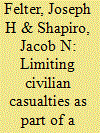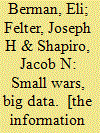|
|
|
Sort Order |
|
|
|
Items / Page
|
|
|
|
|
|
|
| Srl | Item |
| 1 |
ID:
107920


|
|
|
|
|
| Publication |
2011.
|
| Summary/Abstract |
Most aid spending by governments seeking to rebuild social and political order is based on an opportunity-cost theory of distracting potential recruits. The logic is that gainfully employed young men are less likely to participate in political violence, implying a positive correlation between unemployment and violence in locations with active insurgencies. The authors test that prediction in Afghanistan, Iraq, and the Philippines, using survey data on unemployment and two newly available measures of insurgency: (1) attacks against government and allied forces and (2) violence that kill civilians. Contrary to the opportunity-cost theory, the data emphatically reject a positive correlation between unemployment and attacks against government and allied forces (p < .05 percent). There is no significant relationship between unemployment and the rate of insurgent attacks that kill civilians. The authors identify several potential explanations, introducing the notion of insurgent precision to adjudicate between the possibilities that predation on one hand, and security measures and information costs on the other, account for the negative correlation between unemployment and violence in these three conflicts.
|
|
|
|
|
|
|
|
|
|
|
|
|
|
|
|
| 2 |
ID:
151759


|
|
|
|
|
| Summary/Abstract |
Military commanders in wartime have moral obligations to abide by international norms and humanitarian laws governing their treatment of noncombatants. How much risk to their own forces they must take to limit harm to civilians in the course of military operations, however, is unclear. The principle of proportionality in the law of armed conflict all but necessitates that they make a utilitarian calculation: potential harm to civilians must always be balanced against military value when considering actions that could hurt innocents. In asymmetric conflicts, such as most counterinsurgencies, information flows, collaboration, and ultimately the support of the local population can be key to achieving strategic objectives. Thus, limiting casualties to noncombatants and other actions that alienate the population in these types of conflicts is a key part of a winning strategy. The concept of “courageous restraint” was created to express this principle to NATO and U.S. forces fighting in Afghanistan.
|
|
|
|
|
|
|
|
|
|
|
|
|
|
|
|
| 3 |
ID:
163137


|
|
|
|
|
| Publication |
Princeton, Princeton University Press, 2018.
|
| Description |
xxi, 386p.hbk
|
| Standard Number |
9780691177076
|
|
|
|
|
|
|
|
|
|
|
|
Copies: C:1/I:0,R:0,Q:0
Circulation
| Accession# | Call# | Current Location | Status | Policy | Location |
| 059568 | 355.343/BER 059568 | Main | On Shelf | General | |
|
|
|
|
|
|
|
|
|